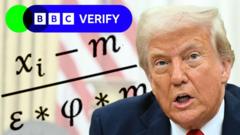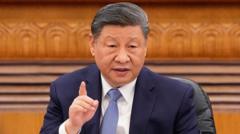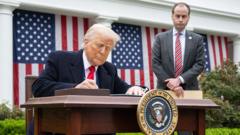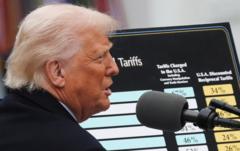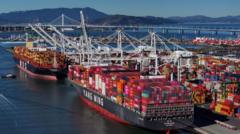In a bold move, former President Trump announced a comprehensive package of tariffs yesterday that excludes only Canada and Mexico, heightening fears of a potential trade war. China faces a 34 percent tariff, while European nations will be subjected to 20 percent. Analysts warn that this could lead to increased costs for Americans and a backlash from affected countries.
Trump Enacts Major Tariffs, Igniting Trade War Concerns

Trump Enacts Major Tariffs, Igniting Trade War Concerns
The former president's sweeping tariffs aim to reshape U.S. trade dynamics, but they come with significant economic risks.
Former President Donald Trump made headlines yesterday by announcing an unprecedented set of tariffs against global trading partners, claiming it marks a pivotal moment for U.S. economic sovereignty. At an event in the White House Rose Garden, he described the action as an "economic liberation" for the American people, declaring "Today we take back control."
Under the new tariffs, nearly all nations will face a standard 10 percent tariff, with notable exceptions for Canada and Mexico. However, the rates are far steeper for key players: China will see tariffs as high as 34 percent, while the European Union will be hit with 20 percent. Japan and India are not spared, facing tariffs of 24 percent and 26 percent, respectively.
Trump's administration argues that these tariffs are necessary to counteract years of unfair trade practices that they allege have disadvantaged U.S. workers and businesses. However, economists warn that the implications could be severe, potentially leading to drastic increases in consumer prices and retaliatory measures from other countries.
"While some anticipated significant tariffs, the figures revealed are remarkable and will likely reshape the landscape of international trade,” remarked Ana Swanson, an international trade analyst. The mixed opinions within Trump's advisory team suggest that there is no consensus on whether the primary aim of these tariffs is to generate revenue or to level the playing field in international trade.
As governments prepare for possible retaliation, the global financial atmosphere may be set for upheaval, making the long-term impacts of this policy uncertain. The trade landscape is shifting dramatically, and observers worldwide are watching closely for reactions.










